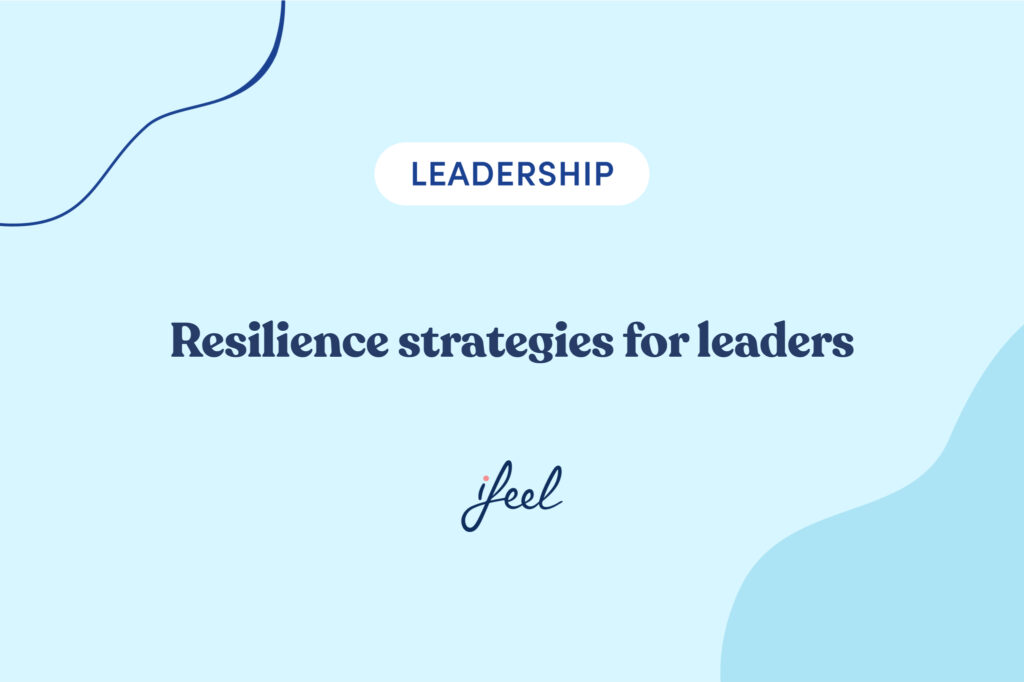Why are resilience strategies for leaders necessary? The truth is that when we think about the responsibilities that directors, managers and leaders have, these are not limited to the pursuit of ambitious goals, but also to being that guide capable of leading their teams through a sea of uncertainties and challenges. All this must be achieved while keeping their own mental health in balance. Which, of course, is no easy task.
Managers, leaders and executives are also human; and therefore, they can be affected by the constant pressure that characterises their jobs. And that is normal. However, having to perform at their best, make complex decisions and constantly inspire their teams can put a considerable strain on their mental wellbeing, which, if not managed properly, can lead to mental ill-health or burnout.
This is why caring for leaders’ mental health is positioned as a critical factor that affects not only their individual performance but also the success and cohesion of the entire team. A leader with robust mental health is able to manage stress effectively, maintain clarity in crisis situations, and provide the necessary support to their teams.
Therefore, developing resilience strategies for leaders is essential not only for their own sustainability, but also for organisational health as a whole.
If you want to learn more about this, we encourage you to download our resource on caring for leaders’ mental health. This resource will provide your leadership team with essential tools for their well-being. Prioritise mental health in your company and provide resilience strategies for leaders.
The importance of leadership care
While crucial, the mental well-being of leaders is often overlooked. According to a report by the Business Group on Health, 77% of large employers reported an increase in mental health concerns among their employees by 2023. Another report states that more than 50% of managers reported experiencing burnout at some point, a figure slightly higher than the average employee’s.
These statistics underline the need to equip managers and executives with resilience strategies for leaders and effective stress management tools to enable the maintenance of mental health in senior management.
In this context, resilience is the shield that allows people in positions of responsibility to not only withstand adversity but also thrive and lead with confidence and clarity. In an environment where change is the only constant, these strategies are indispensable to transform pressure into opportunities and challenges into learning.
On this topic, ifeel leaders contributed:
Gabriele Murrone, Co-founder and CPO of ifeel, highlights:
“Expectations on leaders are always very high. That’s why I believe it is crucial to focus our attention on the goals that will have the greatest impact and to learn to say no when necessary, to protect our mental health.
This reflection not only underlines the importance of personal resilience but also the need to establish a work environment that supports mental well-being. Implementing resilience strategies for leaders, healthy practices, and clear boundaries can help leaders stay in balance, thus optimising their ability to lead their teams to success.
Resilience strategies for leaders
Developing and maintaining resilience is crucial for leaders who want to navigate the challenges of the modern business environment with success and stability. Below, we explore several practical strategies that leaders can adopt to strengthen their resilience and maintain their mental well-being, enabling them to lead with confidence and clarity, despite adversity.
1. Self-awareness and self-care
The first step in building resilience is self-awareness. Leaders must be aware of their own emotions, strengths and areas for improvement. This self-awareness enables them to implement effective self-care practices , the foundation of resilience.
Practical Exercise: Well-being assessment
- Draw a large circle on a sheet of paper representing the total time available daily.
- Divide the circle into sections representing different important areas (family, work, hobbies, rest, self-care, etc.) and assign a percentage of time to each.
- Reflect on the distribution of time you have right now and consider whether you are devoting enough attention to each area. Identify areas of opportunity where you need to spend more time to take care of your mental health.
‘I put a lot of effort into self-awareness and prevention. Over time, I have found that certain activities help me achieve calm and self-connection, such as painting, reading and yoga. But above all, counting on my friends and family is fundamental for my mental well-being”.
-Beatriz Julián Almarcegui, Head of People at ifeel
2. Setting boundaries
Knowing how to say ‘no’ and setting clear boundaries between work and personal life is essential, and is part of resilience strategies for leaders.
Boundaries not only protect the leader’s time and energy, but also serve to set a healthy example for the rest of the team. To begin setting boundaries, you can:
| Strategies for setting boundaries | Description |
|---|---|
| Specific work hours | Define and adhere to set work hours, avoiding responding to emails outside of this time. |
| Task prioritisation | Focus on critical tasks and delegate less important ones when possible. |
| Digital disconnection | Implement periods without electronic devices to reduce stress and improve rest. |
3. Foster a culture of support
One of the key resilience strategies for leaders is to create healthy environments in which all employees, regardless of rank, can talk about their emotions and needs without taboo. Leaders should create an environment of psychological safety, where honest communication about mental health is welcomed. This includes encouraging participation in wellness programmes and offering supportive resources.
4. Develop coping skills
Coping skills are crucial for managing stress and the pressures of leadership. This includes stress management, problem-solving, and time management techniques.
One example of these techniques is deep breathing skills. To implement them you should:
- Sit comfortably with your feet on the floor and your hands in your lap.
- Inhale deeply through your nose for five seconds.
- Hold your breath for three seconds.
- Exhale slowly through your mouth for five seconds.
- Repeat the process five to ten times.
5. Seek professional support
Asking for help is a sign of strength, not weakness. Leaders can greatly benefit from counseling with expert psychologists and counselors who can help them develop personalised resilience strategies.
From ifeel, we encourage you to download our resource on how to care for the mental health of leaders. You will learn all about resilience strategies for leaders, so you can provide your management team with essential tools for their well-being.

Trust the experts
At ifeel, we know that resilience strategies for leaders are essential for the people who guide business decisions. Organisations that invest in their leaders’ well-being and resilience build a solid foundation for long-term success. However, we understand that developing resilience is an ongoing journey that requires dedication and practice.
To assist in this process, our team of psychologists specialising in mental well-being has developed a mental well-being program for companies aimed at helping companies enhance employee engagement and boost productivity.
This collaboration allows HR managers to receive personalised, data-based advice on the most effective measures for detecting employee mental health issues and assessing the workplace climate. It’s the best way to understand their needs.
Moreover, ifeel’s corporate mental well-being solution offers employees a structured mental health care service tailored to their needs at any given time.
We hope you found this article on resilience strategies for leaders interesting. If you want more information about our mental well-being solution for companies, simply request it, and we will contact your team soon.










